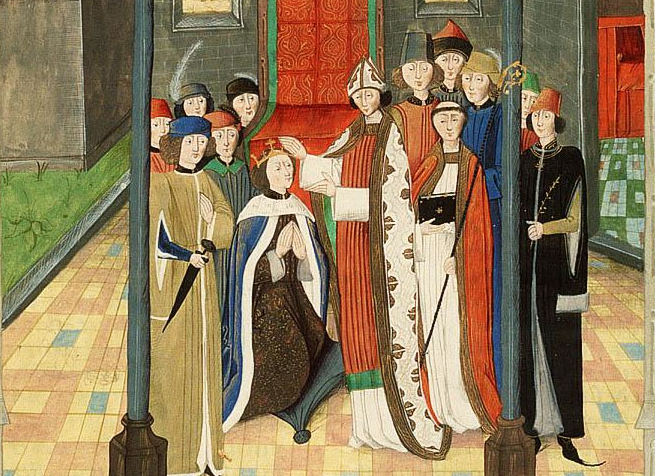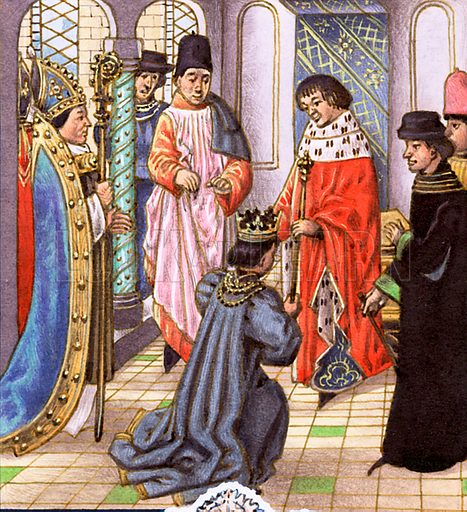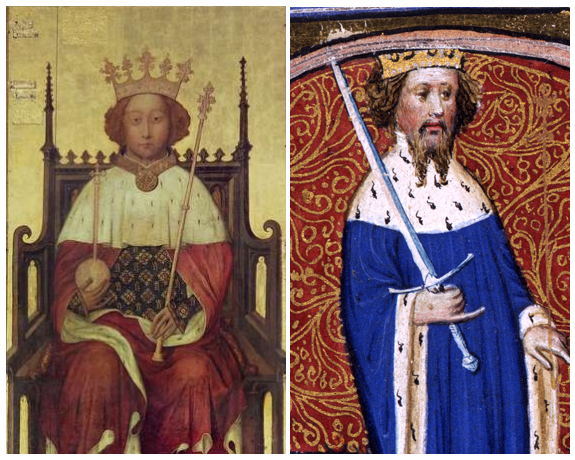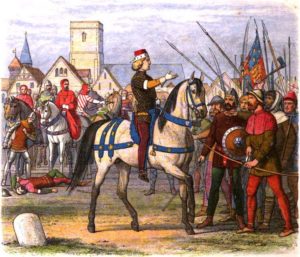飘香于油墨中的草莓:失意与诗意的君王
(六)失意与诗意的君王
《理查二世》首版于1597年,是莎士比亚早期的一部历史剧,讲述了一个不称职的国王的故事。
第二幕是该剧的一个重要转折点,冈特的约翰临终前对侄子理查二世说了一个极坏的诅咒。我发现,出现在莎翁多部戏剧的诅咒似乎都给被诅咒者带来厄运,从老者或濒死者嘴里说出的诅咒尤其灵验。
第二幕第一场,理查二世带着一帮人来看望重病的约翰,约翰对他说:“啊,不要饶恕我, 我的哥哥爱德华的儿子,因为我是他父亲爱德华的儿子。你像鹈鹕一样啄饮亲情血液,喝得酩酊大醉。我的兄弟葛罗斯特是个淳朴善良的好人,在天堂和那些有福的灵魂同享极乐,他就是前例和见证,来说明你对溅洒爱德华的血是毫无顾忌的。和我的疾病一起来加害我吧,你的无情就像衰老驼背的年龄,砍下这一朵久已凋零的花。活在你的耻辱中吧,但耻辱不会和你同归于尽!从今以后这些话会折磨着你。把我搬到床上去,然后再把我送进坟墓;享受着爱和荣誉的人,才会感到生存的乐趣。”
(注:理查二世的父亲黑太子爱德华(Edward the Black Prince,1330-1376年)是英王爱德华三世的长子)
(JOHN OF GAUNT
O, spare me not, my brother Edward’s son,
For that I was his father Edward’s son;
That blood already, like the pelican,
Hast thou tapp’d out and drunkenly caroused:
My brother Gloucester, plain well-meaning soul,
Whom fair befal in heaven ’mongst happy souls!
May be a precedent and witness good
That thou respect’st not spilling Edward’s blood:
Join with the present sickness that I have;
And thy unkindness be like crooked age,
To crop at once a too long wither’d flower.
Live in thy shame, but die not shame with thee!
These words hereafter thy tormentors be!
Convey me to my bed, then to my grave:
Love they to live that love and honour have.

这段话交待了谋杀葛罗斯特公爵(理查二世的叔叔)的正是理查二世本人。从约翰口中说出的“活在你的耻辱中吧,但耻辱不会和你同归于尽”,这个诅咒是跨朝代的,为莎士比亚今后的续集创作奠定了基础。理查二世的耻辱不会随着他的被害而消亡,会继续笼罩继任者的头上。
第四幕第一场中,从卡莱尔主教的嘴里也冒出了类似的预言,现将相关的英文台词翻译如下:
约克公爵:
“伟大的兰开斯特公爵,我奉铩羽而归的理查之命而来,他愿意让您成为他的继承人,把他至尊的权杖交到您庄严的手里。他已经退位让贤,登上他的宝座吧,亨利四世万岁!”
(DUKE OF YORK
Great Duke of Lancaster, I come to thee
From plume-pluck’d Richard; who with willing soul
Adopts thee heir, and his high sceptre yields
To the possession of thy royal hand:
Ascend his throne, descending now from him;
And long live Henry, fourth of that name!
亨利.波林勃洛克:
“以上帝之名,我要登上宝座了。”
(HENRY BOLINGBROKE
In God’s name, I’ll ascend the regal throne.)
卡莱尔主教:
“嗳哟,上帝禁止这种做法!在诸位贵人当中,我是最卑微的,却最适合讲真话。如果上帝在你们这些尊贵的人群中找出一个有资格公平审判尊贵的理查的法官,那么他高贵的精神就会使他不犯下这么重大的错误。哪一个臣子可以判他的君王的罪行?在座的哪一位不是理查的臣子?窃贼们即使罪状确凿,也必须让他们亲自出场,才能审判。难道一位代表着神的威严、为天命所选而治理万民、涂抹香膏、顶戴王冠、已经执政多年的君王,可以由他的出身低微的臣子们来判罪,而他却没有当场辩白的机会吗?哦,上帝保佑啊,在这基督教的氛围内,一群富有教养的人士竟然做出如此可恶、黑暗、卑劣的行为!受到上帝的鼓励,我以一个臣子的身分向臣子们说话,大胆地为他的君王辩护。这位被你们称为国王的赫里福德公爵是一个欺君罔上的奸恶的叛徒,如果你们拥戴他为王,让我预言:英国人的血将使土壤更肥沃,后世的子孙将要为这个恶行而痛苦呻吟;和平将要安睡在土耳其人和异教徒当中,这片乐土将饱受战乱,骨肉至亲自相残杀。混乱、恐怖、惊慌和暴动将要在这里定居,这块国土将要被称为各各他,堆积骷髅的荒场。啊!要是你们帮助一个王族中人倾覆他的同族的君王,将会造成这个被咒诅的世界的最不幸的分裂。阻止它,抵抗它,不要让它实现,免得你们的子孙和你们子孙的子孙们为你们的行为感到悲哀。”
(注:Golgotha, 各各他山,意译为“骷髅地”,乃罗马统治以色列时期耶路撒冷城郊之山,耶稣曾被钉在各各他山上的十字架上。)
(BISHOP OF CARLISLE
Marry. God forbid!
Worst in this royal presence may I speak,
Yet best beseeming me to speak the truth.
Would God that any in this noble presence
Were enough noble to be upright judge
Of noble Richard! then true noblesse would
Learn him forbearance from so foul a wrong.
What subject can give sentence on his king?
And who sits here that is not Richard’s subject?
Thieves are not judged but they are by to hear,
Although apparent guilt be seen in them;
And shall the figure of God’s majesty,
His captain, steward, deputy-elect,
Anointed, crowned, planted many years,
Be judged by subject and inferior breath,
And he himself not present? O, forfend it, God,
That in a Christian climate souls refined
Should show so heinous, black, obscene a deed!
I speak to subjects, and a subject speaks,
Stirr’d up by God, thus boldly for his king:
My Lord of Hereford here, whom you call king,
Is a foul traitor to proud Hereford’s king:
And if you crown him, let me prophesy:
The blood of English shall manure the ground,
And future ages groan for this foul act;
Peace shall go sleep with Turks and infidels,
And in this seat of peace tumultuous wars
Shall kin with kin and kind with kind confound;
Disorder, horror, fear and mutiny
Shall here inhabit, and this land be call’d
The field of Golgotha and dead men’s skulls.
O, if you raise this house against this house,
It will the woefullest division prove
That ever fell upon this cursed earth.
Prevent it, resist it, let it not be so,
Lest child, child’s children, cry against you woe!)

第四幕第一场是《理查二世》的一个小高潮,卡莱尔主教的演讲被安排在该幕剧情的中间,是一场非常重要的台词。他强烈地悍卫了君权神授的专制制度,并给了反叛者一系列的警告、诅咒和不祥的预言。亨利.波林勃洛克和他的手下恼羞成怒,以叛国罪逮捕了卡莱尔主教,但主教的不祥预言仍然笼罩着后面的剧情。
尽管《理查二世》是莎士比亚的早期作品,里面的内心独白和大段优美的台词已经充分展示了作者娴熟高超的写作技巧。细细品尝,但觉满口香醇,陶醉其中,竟然流连忘返。
第四幕第一场,理查二世退位前的几场非凡的演说是该剧最著名的场景之一,值得再三阅读。本人现举出以下几个经典例子:
一:当理查将王冠交给波林勃洛克时,没有打算马上放手,两个人互相注视着对方,理查做了一个很精彩的比喻:“把王冠给我。这儿,贤弟,把王冠拿住了;这边是我的手,那边是你的手。现在这一顶黄金王冠就像一口深井,有两个吊桶,举起一个桶就会使另一个桶落入井中汲水。那空的一桶在空中起舞,满的一桶在底下,不被人发现。我就是那下面的装满了泪水的桶,啜饮着自己的悲伤,你却升到了高空。”
(KING RICHARD II
Give me the crown. Here, cousin, seize the crown;
Here cousin:
On this side my hand, and on that side yours.
Now is this golden crown like a deep well
That owes two buckets, filling one another,
The emptier ever dancing in the air,
The other down, unseen and full of water:
That bucket down and full of tears am I,
Drinking my griefs, whilst you mount up on high.)

(左:理查二世,右:亨利四世)
二:当波林勃洛克直截了当地问他:“你愿意放弃你的王冠吗?”(Are you contented to resign the crown?), 理查陷入了漫长的自言自语中,无可奈何地交出王权:“是,不;不,是;因为我是一个无用的人,所以,不,不,一切悉听尊便。现在,看好了,我怎样把自己变成一个废人。从我的头上卸下这重压,从我的手中放下这粗笨的权杖,从我的心头丢弃这君王的骄傲。我用自己的眼泪洗去了我的香膏,用自己的双手放弃了我的王冠,用自己的舌头否认了我的神圣地位,用自己的呼吸免除了所有的职责仪式。我摒绝一切浮华与尊严,放弃我的庄园、租金、收入,撤销我的法令、裁定、法律,愿上帝赦免所有对我毁弃的誓言!愿上帝保佑一切对你所做的盟约永不遭背叛!让我这个一无所有的人为一无所有而悲哀,让你这个得到一切的人为享有一切而开心!愿你坐在理查的宝位上万寿无疆,愿理查早早长眠于坟坑中!上帝保佑亨利国王,失去王位的理查这样说,送给他许多年阳光灿烂的日子!还有其他的事情吗?”
(KING RICHARD II
Ay, no; no, ay; for I must nothing be;
Therefore no no, for I resign to thee.
Now mark me, how I will undo myself;
I give this heavy weight from off my head
And this unwieldy sceptre from my hand,
The pride of kingly sway from out my heart;
With mine own tears I wash away my balm,
With mine own hands I give away my crown,
With mine own tongue deny my sacred state,
With mine own breath release all duty’s rites:
All pomp and majesty I do forswear;
My manors, rents, revenues I forego;
My acts, decrees, and statutes I deny:
God pardon all oaths that are broke to me!
God keep all vows unbroke that swear to thee!
Make me, that nothing have, with nothing grieved,
And thou with all pleased, that hast all achieved!
Long mayst thou live in Richard’s seat to sit,
And soon lie Richard in an earthly pit!
God save King Harry, unking’d Richard says,
And send him many years of sunshine days!
What more remains?)
三:接着,理查又将自己比作阳光下的雪人,他说:“我不是你的主人,你这盛气凌人的家伙,我也不是任何人的主人。我无名无号,不,连我受洗时给的名字,也被人篡夺了。哎,这沉重的日子,我枉度了这么多的岁月,现在却不知道应该用什么名字来称呼自己。喔,如果我是一尊由雪堆成的滑稽的国王塑像,我会站在波林勃洛克的阳光之前,化成水滴而溶解。好国王,伟大的国王,虽然你不是最仁厚的,如果我的话在英国还有价值的话,吩咐他们立刻拿一面镜子到这儿来,让我看一看失去了君主的尊严后,我有一张什么样的面孔。”
(KING RICHARD II
No lord of thine, thou haught insulting man,
Nor no man’s lord; I have no name, no title,
No, not that name was given me at the font,
But ’tis usurp’d: alack the heavy day,
That I have worn so many winters out,
And know not now what name to call myself!
O that I were a mockery king of snow,
Standing before the sun of Bolingbroke,
To melt myself away in water-drops!
Good king, great king, and yet not greatly good,
An if my word be sterling yet in England,
Let it command a mirror hither straight,
That it may show me what a face I have,
Since it is bankrupt of his majesty.)
四:波林勃洛克吩咐手下去拿镜子时,理查说:“他们会满意的:当我看到那本记载着我的罪恶的书册,也就是当我看见我自己的时候,我要读到很多内容。”
侍从持镜重上。
理查二世:“把镜子给我,我要从那里阅读我自己。还没有更深的皱纹吗?悲伤把这么多重击打在我脸上,难道没有留下更深的伤痕吗?啊,献媚的镜子!正像我荣盛时期的那些追随者一样,你欺骗了我!这就是每天有一万人在他的屋檐下服侍的那张脸吗?这就是那张像太阳一样让人不敢直视的脸吗?这就是那张曾经面对着许多愚蠢的行径、最后被波林勃洛克挫败的脸吗?一道脆弱的荣耀在这张脸上闪烁,这张脸和荣耀一样脆弱。
(将镜子狠摔在地上)
瞧,它在那儿摔成碎片了。沉默的国王,注意这场游戏的教训吧,悲伤如此迅速地摧毁了我的脸。”
(KING RICHARD II
They shall be satisfied: I’ll read enough,
When I do see the very book indeed
Where all my sins are writ, and that’s myself.)
Re-enter Attendant, with a glass
(Give me the glass, and therein will I read.
No deeper wrinkles yet? hath sorrow struck
So many blows upon this face of mine,
And made no deeper wounds? O flattering glass,
Like to my followers in prosperity,
Thou dost beguile me! Was this face the face
That every day under his household roof
Did keep ten thousand men? was this the face
That, like the sun, did make beholders wink?
Was this the face that faced so many follies,
And was at last out-faced by Bolingbroke?
A brittle glory shineth in this face:
As brittle as the glory is the face;)
Dashes the glass against the ground
(For there it is, crack’d in a hundred shivers.
Mark, silent king, the moral of this sport,
How soon my sorrow hath destroy’d my face.)

我发现莎士比亚在几部戏剧里都将君王比作了太阳,荣盛时期的理查二世有着一张“像太阳一样让人不敢直视的脸”,当他被迫交出王位时,“一道脆弱的荣耀在这张脸上闪烁”,表明他这个旧太阳的光芒即将消失,取而代之的是波林勃洛克这个新太阳。被废黜的理查则像“一尊由雪堆成的滑稽的国王塑像“,“站在波林勃洛克的阳光之前,化成水滴而溶解。”《亨利四世》第一部里的哈里王子暗自“效仿太阳”,“它容许污浊的云层遮住了它的美丽,然而当它穿透似乎要扼杀了它的肮脏丑陋的雾障,重新大放光彩的时候,人们因为有一阵子没见着它,对它格外惊叹。”- 可见他已为将来继承王位在悄悄锤炼自己了。
理查二世被废黜前的表现可圈可点,妙语连珠,出口成章,他的长篇独白与波林勃洛克的短句形成鲜明对比,前者像诗人,后者是行动家。这让我想起南唐的李后主在丢了江山后写下的:“一旦归为臣虏,沈腰潘鬓消磨。最是仓皇辞庙日,教坊犹奏别离歌,垂泪对宫娥。”后来的一首“问君能有几多愁,恰似一江春水向东流”,干脆让他丢了性命。
理查二世与李后主一样,不适合做一国之君,也许更适合做个诗人吧。